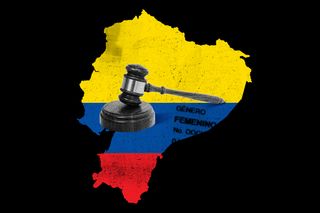
In Ecuador, a Cis‑Man Legally Changed His Gender to Gain Custody of Children, Worrying Trans Rights Groups
LGBTQ groups are concerned that this goes against the “spirit of the law” and could eventually lead to legislation against trans people.

René Salinas Ramos, a 47-year-old cisgender man from Ecuador, legally changed his gender to female last week to gain custody of his children. As reported by Vice, Salinas Ramos made use of a 2015 law designed to promote transgender rights in the country, and this has concerned trans rights activists in Ecuador. The incident highlights how trans rights may be undermined by cisgender persons who may not understand the nuances and importance of legislation meant to safeguard transgender rights.
“I am very sure of my sexuality. What I have sought is that I want to be a mother, so that I can also give the love and protection of a mother,” Salinas Ramos told local news outlet La Voz del Tomebamba outside the civil registry office of Cuenca after legally changing his gender. “The laws say that the one who has the right is the woman. As of this moment, I am female. Now I’m also a mom, that’s how I consider myself.” While Salinas Ramos’ case may merit a discussion on equal custody rights for both (or, all) parents to their children, the use of this case to justify changing genders on paper — especially when a cisgender person is insistent about not actually being conflicted with their sexuality or assigned gender — can ultimately be harmful to trans rights.
The case may undo years of activism on the part of trans activists that led to gender-affirmative legislation in the first place. “We are afraid that in the Assembly things will go backward and they will start legislating against us,” Diane Rodriguez, Ecuador’s first transgender Assembly person from 2018 to 2021, and one of the activists at the forefront of ensuring the 2015 legislation, told Vice. Rodriguez added, “it does not make sense that you have changed your gender in the identity document without being a trans person, only with the objective of taking advantage to obtain custody.”
In 2015, Ecuador passed the Gender Identity Law that allowed its citizens to mention their self-identified gender instead of their biologically assigned sex at birth on legal documents. With this law, Ecuador became one of only a handful of countries that recognize the right to self-determination of gender in their law. A cornerstone of trans rights activism, the right to gender self-determination still remains elusive to transgender individuals in most countries around the world. Several places, in fact, are seeing a return of policies and laws that would lead to stringent rules around people being allowed to change their gender.
Related on The Swaddle:
Rajya Sabha Passes Transphobic Transgender Persons Bill
In India, for instance, the government in 2019 passed the controversial and transphobic Transgender Persons Bill that stated that “a transgender person must apply to their District Magistrate for a certificate of identity that establishes their gender as transgender and, if desired, for a certificate of identity that re-establishes their gender as a man/woman should they undergo gender-affirming surgery.” As The Swaddle noted, “this sets up the District Magistrate to determine whether a transgender person … is a transgender person or not.” Elsewhere, in many parts of the US, conservative politicians and people have worked to revoke and restrict gender-affirming care for transgender students. In competitive sports, regulatory authorities have drawn up laws that would allow only the most “feminine” athletes to take part in women’s events — at times even leaving out non-white women from the scope of competing.
These instances point out how precious the right to self-determination of gender is. In letting people choose their identity in their own terms, the right doesn’t only help transgender individuals to navigate their gender dysphoria in their personal ways but also is a radical piece of legislation that negates the value of ascribed identities on the basis of one’s biological sex. The case of Salinas Ramos threatens this cornerstone right of transgender activism. Activists fear that it may even lead to the state retaining its rights over being the final arbiter of a person’s gender, compromising the right to self-determination of identity for transgender persons.
This, however, is tricky territory. Notions of masculinity, femininity, or queerness are hard to determine by a set yardstick. The same, then, goes for transness — any regulatory body that attempts to keep cases like that of Salinas Ramos in check could foreground certain parameters of trans identity. In other words, it could lead to a situation where people gate-keep what it means to be transgender, excluding any behaviour, trait, or person who deviates from the ambit of legal recognition and protection.
Salinas Ramos’ urgency to change his gender for custody of his children, he explained, stemmed from his inability to visit them in over five months. He alleged that his daughters lived in an abusive environment with their mother. Salinas Ramos claimed that “being a father in Ecuador is punished,” adding that he is “only seen as a provider.” This allegation, then, complicates the law’s relationship with gender — showing how it’s both the site for self-determination and restriction simultaneously.
Amlan Sarkar is a staff writer at TheSwaddle. He writes about the intersection between pop culture and politics. You can reach him on Instagram @amlansarkr.
Related


Barbados Task Force Seeks Reparations From Families Who Owned Slave Plantations
